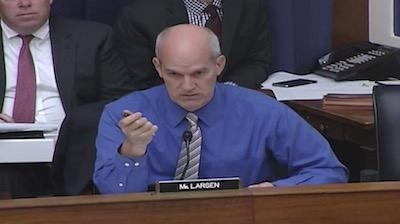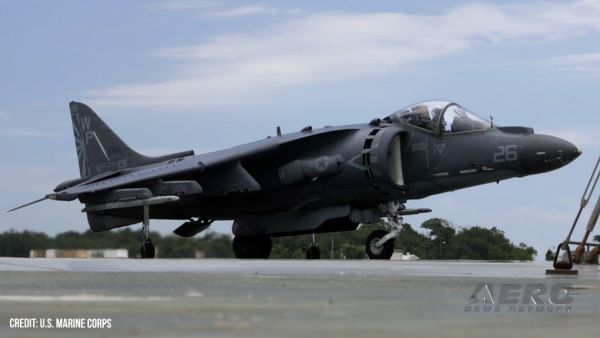Fri, May 19, 2017
Calls For Focus On Bipartisan Agreement In FAA Reauthorization Talks
In a hearing of the House Committee on Transportation, Rep. Rick Larsen (D-WA), the senior Democrat on the House Subcommittee on Aviation, took aim at glaring inconsistencies in a Republican proposal to privatize the nation’s air traffic control system and called for focus on bipartisan agreement in the upcoming FAA reauthorization.

“Inspector we heard in some comments today that the air traffic control system is safe, but it is broken… I fly 2,306 miles and back again for my commute. Can the system be safe and broken? Or should I drive? It seems to me that there is a fundamental argument here that we have to go to privatization because the system is broken that controls the air space, and if it is broken I don’t know how it can be safe,” said Larsen (pictured).
Calvin Scovel, III, Inspector General of the U.S. Department of Transportation acknowledged the contradiction in the argument put forth by privatization-backers. “I would characterize the system certainly as safe…and I would take issue with the ‘broken’ characterization,” he said.
“The main point is we are not working on a privatization bill, we are working on a FAA reauthorization bill which has many moving parts – many of which Democrats and Republicans agree upon – but they are being held up by this one debate,” Larsen said in an exchange with Joseph W. Brown, President of Hartzell Propeller.
Larsen has led Democratic opposition to the plan to privatize the Federal ATC system, and Larsen has consistently raised concerns about the challenges and unanswered questions involved in proposed privatization plans. A November 2016 Government Accountability Office report found that aviation experts are deeply divided and unable to answer serious questions about the impacts to national security and the financial stability of the ATC system if it were privatized.
Key findings of the report include that the GAO’s panel of aviation experts could not confirm that a private ATC system would be capable of protecting national security and collaborating with the military to ensure the safety of our National Airspace System. Nor could they guarantee that a private corporation would speed up technological advances and NextGen implementation. The experts confirmed that a privatized air traffic control system would be heavily and negatively impacted by an economic downturn and a decrease in air travel.
(Source: Congressman Rick Larsen news release. Image from video provided)
More News
LinxUs System Adds Capabilities for Data-Driven Operators Textron Aviation announced another option for operators processing their post-flight data, adding interoperability with GE>[...]
Aero Linx: The de Havilland Moth Club Ltd The de Havilland Moth Club evolved from a belief that an association of owners and operators of Moth aeroplanes should be formed to create>[...]
(Pilot) Inadvertently Applied Excessive Braking Action, And The Airplane Nosed Over Analysis: The pilot reported that, while landing at a remote, rough and uneven airstrip in a tai>[...]
“MCADT is committed to rapidly integrating armed first-person view drones into the FMF, enhancing small-unit lethality and providing organic capabilities that warfighters cur>[...]
From 2017 (YouTube Edition): Major Engine Supplier Joins Forces With Small Aircraft Manufacturer… GE recently made an agreement with Venom Aircraft to supply engines for the>[...]
 Citation Operators Get Another Flight Data Connection for QA
Citation Operators Get Another Flight Data Connection for QA ANN's Daily Aero-Linx (06.01.25)
ANN's Daily Aero-Linx (06.01.25) NTSB Final Report: Bellanca 8GCBC
NTSB Final Report: Bellanca 8GCBC Aero-News: Quote of the Day (06.01.25)
Aero-News: Quote of the Day (06.01.25) Classic Aero-TV: High-Speed Match-up - Venom and GE Rebirth A Legend
Classic Aero-TV: High-Speed Match-up - Venom and GE Rebirth A Legend



